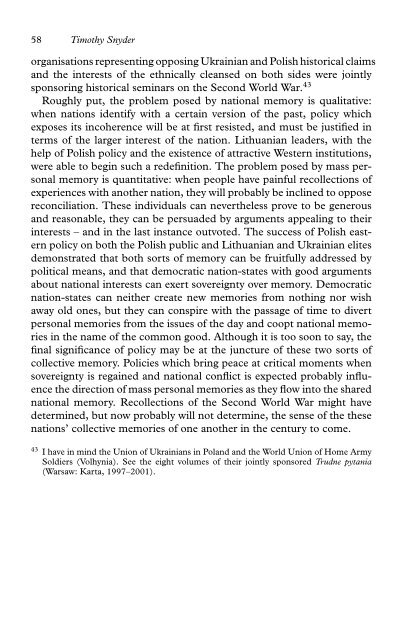Memory and Power in Post-War Europe: Studies in the Presence of ...
Memory and Power in Post-War Europe: Studies in the Presence of ...
Memory and Power in Post-War Europe: Studies in the Presence of ...
Create successful ePaper yourself
Turn your PDF publications into a flip-book with our unique Google optimized e-Paper software.
58 Timothy Snyder<br />
organisations represent<strong>in</strong>g oppos<strong>in</strong>g Ukra<strong>in</strong>ian <strong>and</strong> Polish historical claims<br />
<strong>and</strong> <strong>the</strong> <strong>in</strong>terests <strong>of</strong> <strong>the</strong> ethnically cleansed on both sides were jo<strong>in</strong>tly<br />
sponsor<strong>in</strong>g historical sem<strong>in</strong>ars on <strong>the</strong> Second World <strong>War</strong>. 43<br />
Roughly put, <strong>the</strong> problem posed by national memory is qualitative:<br />
when nations identify with a certa<strong>in</strong> version <strong>of</strong> <strong>the</strong> past, policy which<br />
exposes its <strong>in</strong>coherence will be at first resisted, <strong>and</strong> must be justified <strong>in</strong><br />
terms <strong>of</strong> <strong>the</strong> larger <strong>in</strong>terest <strong>of</strong> <strong>the</strong> nation. Lithuanian leaders, with <strong>the</strong><br />
help <strong>of</strong> Polish policy <strong>and</strong> <strong>the</strong> existence <strong>of</strong> attractive Western <strong>in</strong>stitutions,<br />
were able to beg<strong>in</strong> such a redef<strong>in</strong>ition. The problem posed by mass personal<br />
memory is quantitative: when people have pa<strong>in</strong>ful recollections <strong>of</strong><br />
experiences with ano<strong>the</strong>r nation, <strong>the</strong>y will probably be <strong>in</strong>cl<strong>in</strong>ed to oppose<br />
reconciliation. These <strong>in</strong>dividuals can never<strong>the</strong>less prove to be generous<br />
<strong>and</strong> reasonable, <strong>the</strong>y can be persuaded by arguments appeal<strong>in</strong>g to <strong>the</strong>ir<br />
<strong>in</strong>terests – <strong>and</strong> <strong>in</strong> <strong>the</strong> last <strong>in</strong>stance outvoted. The success <strong>of</strong> Polish eastern<br />
policy on both <strong>the</strong> Polish public <strong>and</strong> Lithuanian <strong>and</strong> Ukra<strong>in</strong>ian elites<br />
demonstrated that both sorts <strong>of</strong> memory can be fruitfully addressed by<br />
political means, <strong>and</strong> that democratic nation-states with good arguments<br />
about national <strong>in</strong>terests can exert sovereignty over memory. Democratic<br />
nation-states can nei<strong>the</strong>r create new memories from noth<strong>in</strong>g nor wish<br />
away old ones, but <strong>the</strong>y can conspire with <strong>the</strong> passage <strong>of</strong> time to divert<br />
personal memories from <strong>the</strong> issues <strong>of</strong> <strong>the</strong> day <strong>and</strong> coopt national memories<br />
<strong>in</strong> <strong>the</strong> name <strong>of</strong> <strong>the</strong> common good. Although it is too soon to say, <strong>the</strong><br />
f<strong>in</strong>al significance <strong>of</strong> policy may be at <strong>the</strong> juncture <strong>of</strong> <strong>the</strong>se two sorts <strong>of</strong><br />
collective memory. Policies which br<strong>in</strong>g peace at critical moments when<br />
sovereignty is rega<strong>in</strong>ed <strong>and</strong> national conflict is expected probably <strong>in</strong>fluence<br />
<strong>the</strong> direction <strong>of</strong> mass personal memories as <strong>the</strong>y flow <strong>in</strong>to <strong>the</strong> shared<br />
national memory. Recollections <strong>of</strong> <strong>the</strong> Second World <strong>War</strong> might have<br />
determ<strong>in</strong>ed, but now probably will not determ<strong>in</strong>e, <strong>the</strong> sense <strong>of</strong> <strong>the</strong> <strong>the</strong>se<br />
nations’ collective memories <strong>of</strong> one ano<strong>the</strong>r <strong>in</strong> <strong>the</strong> century to come.<br />
43 I have <strong>in</strong> m<strong>in</strong>d <strong>the</strong> Union <strong>of</strong> Ukra<strong>in</strong>ians <strong>in</strong> Pol<strong>and</strong> <strong>and</strong> <strong>the</strong> World Union <strong>of</strong> Home Army<br />
Soldiers (Volhynia). See <strong>the</strong> eight volumes <strong>of</strong> <strong>the</strong>ir jo<strong>in</strong>tly sponsored Trudne pytania<br />
(<strong>War</strong>saw: Karta, 1997–2001).
















